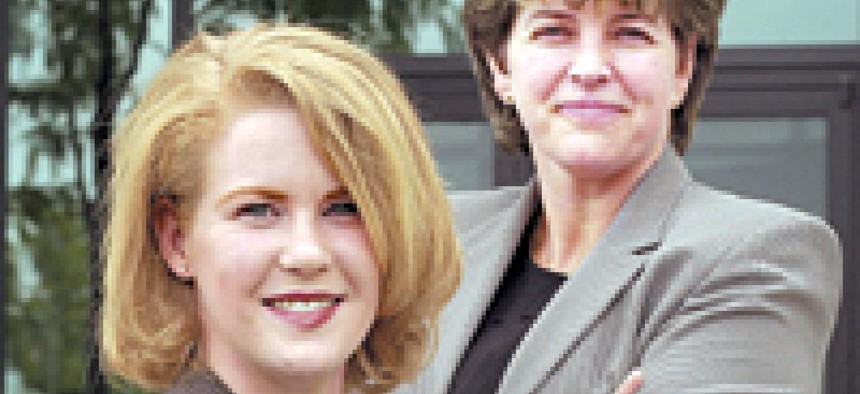Taking it personally

Just two weeks before Sept. 11, a team of employees from SRA International Inc. handed over control to the Navy of a command center the team had built.
Just two weeks before Sept. 11, a team of employees from SRA International Inc. handed over control to the Navy of a command center the team had built. Many of the Navy personnel that SRA's employees had worked with and came to know as friends were killed when American Airlines Flight 77 plowed into the Pentagon and destroyed the command center."People were understandably distraught," said Ernst Volgenau, president and chief executive officer of the Fairfax, Va., company.The same SRA staff returned to the Pentagon and rebuilt the command center. "Like many Americans, they are proud of what they are doing, and resolved to carry on the work that helps keep us safe as a country," Volgenau said. Emotional upheaval, followed by steadfast resolve, was witnessed throughout the ranks of government information technology contractors this past year. The experience has changed workers and the workplace ? most say for the better.At Vredenburg Co. of Reston, Va., the Sept. 11 death of employee Vicki Yancey on Flight 77 was a vivid reminder of the importance of family and home. "When that happened, I think all of us were conscious of the importance of work-life balance," said Chick Baboyian, president and chief executive officer. "Now, we try to be a little more conscious of employee needs and desires. We are more flexible about allowing flex time and telecommuting."At GTSI Corp., Chantilly, Va., some employees also lost family and friends in the attacks. Others were uncertain how their ethnicity would be perceived after men with similar ethnic backgrounds had carried out terrorism on American soil. GTSI responded by developing new training to help managers be more responsive to employee needs. Previous company training had focused on increasing productivity and sales, said Ann Rollins, manager of training and organizational development. Sept. 11 spurred the addition of new material, including lessons on diversity and respect in the workplace and on emergency response."We needed to be more proactive and more aware of our employees," said Bridget Atkinson, vice president of human resources.While the terrorist attacks led to a renewed emphasis on family, relationships and employee welfare, it also helped renew a sense of pride and meaning in work."You take it very personally when one of your own is lost. For some people, that inspires them to work harder," said Devette Lancon, assistant vice president and director of employment for Science Applications International Corp. of San Diego. SAIC employee Khang Nguyen died Sept. 11 at the Pentagon. "There is a different spirit with which people do things, driven by customers who have brand-new requirements they did not have a year ago, and driven by entrepreneurs who may have had innovations they had been working on for a while, but are more important now," Lancon said. After the attacks, many contractors worked long hours for weeks to help their government customers recover, maintain and create new IT systems to fulfill the government's homeland security mission. They worked without complaint and often with new intensity and ingenuity, executives said. "We have a number of people who worked 12-hour shifts for seven days in a row, a month at a time, and they all wanted to do it," said Donald Winter, president and chief executive officer of TRW Systems in Reston, Va. "I was not surprised to see it," he said, "but I was surprised to see the universality of it, and the extent to which people really looked committed and searched hard to find ways to do things."Contractors ? from CEOs to the rank and file ? are committed to the homeland security mission, executives said, even when that means temporarily dismissing the corporate bottom line.Anteon International Corp. of Fairfax, Va., for example, has invested in developing new homeland security technologies not under contract to any government agency, including a communications system, a training system for military and first responders working in urban environments and a detection system for chemical and biological agents. "When Sept. 11 happened, even the chairman of the board said if there is anything we can do, let's do that up front and worry about the business aspects of it later," said Ken Guest, president of Anteon's Information Systems Group.


The focus of training changed at GTSI after Sept. 11, said Ann Rollins (left), manager of training and organizational development, and Bridget Atkinson, vice president of human resources.
Susan Whitney
NEXT STORY: Inside Track